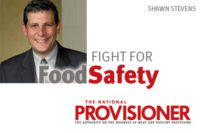Each year, more and more food companies discover the critical importance of having good food product recall insurance. It is a topic I write about, and speak about, often. I do so because I have seen, and continue to see, time and again, how devastating recalls can be in the absence of a good recall policy. Not just a policy, but a good policy.
As we know, the food industry is fraught with risks that can have catastrophic consequences if not managed correctly. One of the most significant risks is a food recall. While many think of recalls primarily in the context of pathogens (and many recall policies only cover this type of recall), it is important to keep in mind that recalls can occur for a variety of reasons, including foreign material contamination, mislabeling, and other issues that may pose a health risk to consumers. The costs associated with a food recall can be staggering, and will often include disposal of product, transportation, administration fees, lost sales, lost customers, reputational damage, regulatory compliance costs, and potential legal claims.
Purchasing food recall insurance is a crucial step that food companies can take to mitigate this risk and protect their businesses from the devastating financial ramifications of a recall. But before purchasing the insurance, it is vitally important to know what coverage you are purchasing. Recall insurance is only as good as the policy it is written on.
Unfortunately, some insurance company offerings are so replete with exclusions and conditions that the policies are effectively worthless. Worse, it is often the case that these exclusions and conditions are deceptively placed or hidden in such a way that the average insured is unlikely to notice them (i.e., in the long list of definitions). For example, the coverage provided might state that “all Recall Costs shall be covered, up to the limit of insurance.” That sounds great until you realize “Recall Costs” are defined elsewhere in the policy as “only the necessary and direct costs actually spent notifying customers about the Recall, and shall not include any product costs, disposal costs, lost profits or other costs of any kind.” While such pitfalls are more prevalent than many realize, they can be avoided through care. Having an attorney review the policy is an effective way to ensure you are purchasing adequate coverage. An experienced attorney will be able to identify gaps, ambiguities, and unreasonable exclusions.
Ultimately, the insurance industry is like any other. There are good, reliable, companies selling good, reliable products. Then there are the others. A careful reading of the policy, and seeking the advice of others, will go a long way in identifying which type of policy (good or bad) you are dealing with.
Purchasing adequate recall insurance is not just a smart business decision; it is an ethical one. Purchasing recall insurance is a proactive way to protect your customers, consumers, brand, and even your employees, as the losses stemming from a recall can jeopardize the very existence of their jobs.
I cannot stress how important it is to have a good policy of recall insurance. Good recall insurance means a policy that provides broad coverage, without onerous exclusions, and with limits sufficient to cover your potential losses. Not all insurance is created equal. As such, it is important to regularly reassess and reevaluate your coverage to ensure it is adequate, and to do so before you find yourself in need of it.





Report Abusive Comment